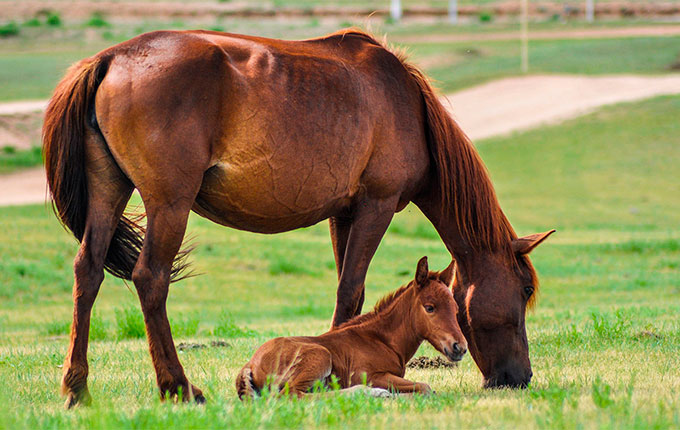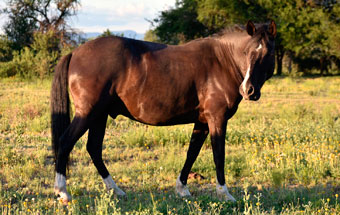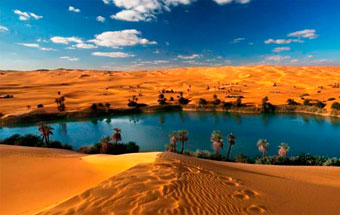Guide to slow down aging in your horse
By: Nestor Imberti Posted: 31/08/2023
Aging is a gradual process that occurs with time in all living things including horses, of course.
As horses age, they undergo both physical and behavioral changes that we sometimes don't notice until those signs become a health issue or disease.
That is why learning to recognize those signs is crucial and caring for our old equine friends will help keep their vitality and well-being.
In this post, we will address the aging process in horses and the symptoms that we should look out for.
Besides, we will give you some practical tips to "stop the sands of time from running out" and provide your senior horse with the right management and care.
But let's start from the beginning:
What is aging?
From a biological point of view, aging results from the impact of the accumulation of a wide variety of molecular and cellular damage over time, which leads to a gradual decrease in physical and mental capacity, and a growing risk of disease.
This damage occurs as metabolism slows down affecting the speed of cell turnover.
As your horse ages, slow cell regeneration impacts different processes, including recovery time and the immune response.
You may have noticed that you find it increasingly difficult to recover after a late night or very intense exercise. Something similar happens to your older horse – more time is needed for his body to repair itself after strenuous exercise.
However, the aging process is different for each individual.
This variability depends mostly on two factors: the horse’s breed and size.
As a matter of fact, smaller breeds tend to live longer than larger ones.
What’s more, due to evolution and crossbreeding, some breeds are more resilient and long-lived than others, such as Arabian or Shetland horses, and other smaller breeds.
Stages of aging
Although, as we have seen, physical changes do not take place in linear fashion or uniformly, and their link with the chronological age of the horse depends on different factors, in general we could list the following life stages:
Prime years (12 to 16 years): During this stage, horses are in the top physical state and their performance and recovery are optimal.
Adulthood (16 to 20 years): During this stage, the first signs of aging appear. We should pay attention to subtle changes in the horse’s behavior and overall health in order to act accordingly.
Senior horse (20 to 25 years): Signs of aging become more evident during this stage. Senior horses may experience reduced physical ability and show changes in appearance and weight.
Old horse (25 years and older): During this stage, horses are considered to be old. They require special care and closer attention for a good quality of life.
Would you like to be part of a group with an equestrian soul?
Join the Ampascachi Community. Obtain exclusive benefits for your holidays.
We tell you how to start, train and take care of your horse.
Interviews with direct providers of riding tours around the world.
Opinions of outstanding equine scientists and personalities in the equestrian sport world.
What are the signs of aging?
It is important to be attentive to the signs of aging in our horses to offer them the management and care they need.
Some common signs of aging include:
- Gray hair.
- Worn-down teeth.
- Blurred vision.
- Increased need of rest.
- Reduced activity and movement.
- Weight loss and muscle mass reduction.
- Cold or heat intolerance.
However, there are less noticeable changes that are equally important:
- Low white blood cell count which increases their risk of getting infections.
- Loss of strength and elasticity in tendons and ligaments.
- Age-associated changes in cardiovascular structure and function.
- Less digestive efficiency and decreased digestive enzymes that aid in breaking down nutrients.
- Certain types of colic become more common with age.
In some cases, these physical symptoms may lead to changes in behavior.
The horse’s personality is partly shaped by his training, upbringing, living environment and past experiences.
In general, equine personality develops before 10 years of age and no major changes usually occur after that.
Nevertheless, loss of vision or hearing can cause horses to become more skittish with age.
How to slow down aging?
Fortunately, there are several steps we can take to slow down the aging process and help our older horses live a healthy life.
Look at these helpful tips:
Training and appropriate exercise
Regular training is crucial, especially during the first few years of a horse's life. Exercise helps build strong tendons and is the foundation for a healthy and happy life.
Hacking out and controlled exercise will help keep your horse fit and full of vitality for much longer.
Lifestyle and balanced diet
Your horse's lifestyle is very important and his nutritional requirements shouldn’t be overlooked. Since their stomach is rather small, horses need to eat small amounts of feed throughout the day.
The type and amount of feed will vary according to the horse’s needs and activity level. Monitor your horse's body weight to prevent obesity and thus health issues.
Daily and regular checks
You can take photos of your horse from different angles and save them, so you can compare them and see the changes over the years.
If you also keep track of your horse’s weight, temperature, heart and breathing rate, you will have a collection of important data to help prevent future conditions.
Subscribe to the Ampascachi Community and obtain benefits and exclusive content. Furthermore, we offer free advice on horses and equestrian tourism.
And how do I care for my veteran horse?
When horses enter their senior years, we should pay special attention to their particular needs.
However, there are some general recommendations that can be very useful in any case:
Good warm-up
Before any activity, make sure to warm up your horse correctly. Between 10 and 15 minutes will be enough to help prevent injury and prepare the muscles and joints for more strenuous exercise.
Balanced diet
Senior horses often have issues chewing and swallowing. Since their digestive system tends to be less efficient at processing and absorbing nutrients, we should choose their portions well.
Check for dehydration
Older horses may have less elastic skin that returns slowly to its normal position even if the horse is well hydrated. Check the mucous membranes of his mouth to make sure they are moist.
Protection from extreme weather
Horses should always be provided with shelter, so that they can protect themselves at all times against rain, sun, wind and snow. In very cold weather consider using a blanket, especially with vulnerable horses.
Check the hooves
Check your horse's hooves on a regular basis and ask for professional advice if you notice something unusual. Hoof problems can affect the horse’s joints and tendons and lead to irreversible damage.
Protect the immune system
Check for any unusual vaccine reactions. Balance your horse’s diet with vitamin, antioxidant and mineral supplements.
Deworming
Perform regular tests on your horse to identify his internal parasite burden and help determine the presence of parasite resistance
Dental care
Check your horse’s mouth and teeth regularly and, in case of any problem, make sure to ask your local equine dental professional to visit your horse.
Show them love and gratitude
Remember that our horses have been our most loyal, long-term buddies. Now is the time to give back to them during this stage of their life.
Are you passionate about horses, too? Do you want to learn how to train them?
Download our free ebook Horse training step by step. When you see how your horse learns and begins to understand your signs and aids, you will be filled with joy.
~
THIS COULD ALSO BE INTERESTING

How to understand the welfare of horses
Discover the evolution and implementation of the 5 domains model for animal welfare applied to equids. Assess the well-being of your horse based on his physical and mental health.

Peruvian Paso Horse I – Origin of the breed
We explain in detail why the breeders of Peruvian Paso Horses believe that we have an equestrian jewel in our hands.

Horseback treks in Morocco
We display the different ways of traveling around the mountains, the exuberant valleys and the sandy desert with its oases, the ancient Moroccan cities by horseback.
~
WHAT IS YOUR OPINION? LEAVE A COMMENT
Planning your horse riding holidays?
Join the Ampascachi Community. You will get exclusive advantages and guidance for your next horse riding holiday.


 German
German French
French Spanish
Spanish